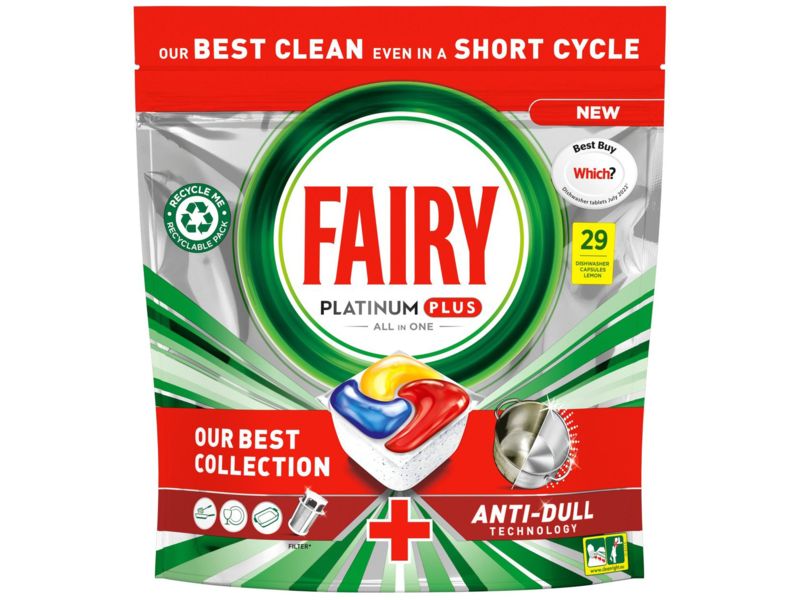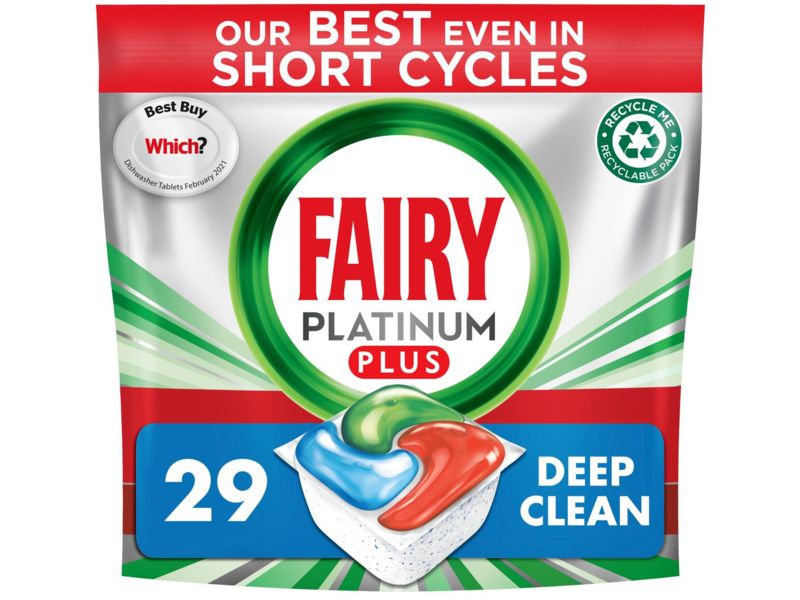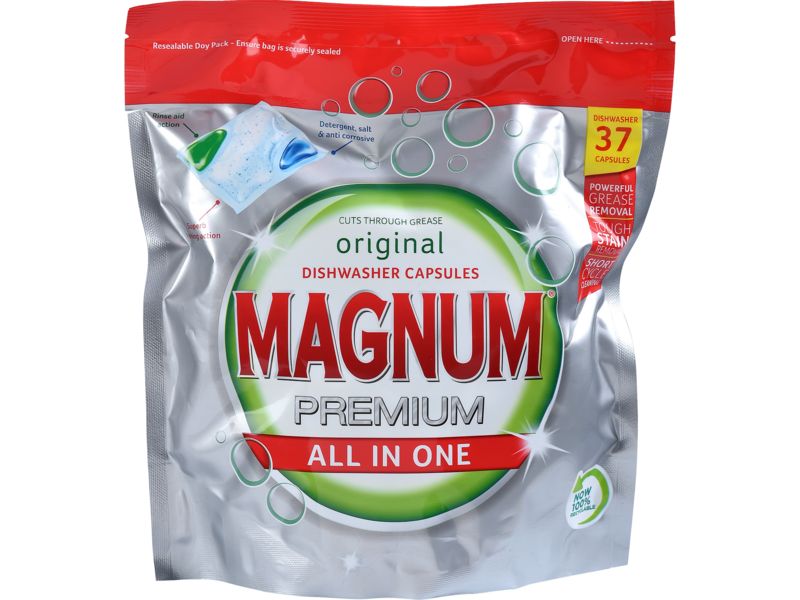How we test dishwasher tablets

Only the best dishwasher tablets can successfully shift stubborn food and drink stains, stop glasses from going cloudy, and keep streaks and water marks at bay.
We've put dishwasher tablets from big brands and supermarket own labels through our tough independent tests to find out how well they perform.
This involved putting more than 400 loads of dirty dishes through the dishwasher so our reviews can answer the most important questions about dishwasher detergents:
- How well does it remove different food and drink stains?
- Will it stop my glasses going cloudy?
- How well does it prevent water marks?
- Will it keep my dishes and cutlery shiny?
- Is it a sustainable option?
- Should I buy it?
Our rigorous tests reveal how big-brand dishwasher tablets from the likes of Fairy, Ecover and Smol compare with supermarket alternatives from Aldi, Ocado and Sainsbury's, so you can see whether or not it's worth spending a bit more to get stain- and streak-free dishes.
Take a look at our pick of the best dishwasher tablets to find out which detergents deliver first-class results across all our tests.
How well does it remove foods and drinks?
We use a range of foods and drinks in our dishwasher tablet tests to represent the different types of residue you'd expect to wash off in the dishwasher. But to put dishwasher tablets through their paces, we use some of the toughest foods we can find:
- Tea – a bleachable stain, so we use it to test how effectively detergents remove coloured stains.
- Starch – starchy marks show how well a detergent can clean residue from pasta, rice and potatoes.
- Egg yolk – dried-on, this stain tests how well detergents wash off protein-rich foods, including meat.
- Dried-on milk – this is really tough to shift, so we use it to give a good indication of overall cleaning power.
- Tough grease – made up of peanut oil, lard and albumin (a protein found in egg whites).
In our lab we use cups, glasses, plates and baking sheets covered in carefully measured amounts of these substances. After washing them at 50°C, we measure how much residue remains.
We find big differences between the best and worst dishwasher tablets we test – as you can see in the gallery below.
We know that the cups, plates and cutlery you put in your dishwasher are encrusted with more than the specific stains in our test. So we also add a mixture of other common foods to each load, including margarine, flour and sauces.
In our test results, a full five-star cleaning score means that all of the stain is removed. One star means that half of the food or drink applied still remains on the dishes - which means you'd have to wash up again by hand.
Will it stop my glasses going cloudy?
We wash glasses, plates, cutlery and plastic food-storage containers multiple times to see whether there’s evidence of residue, cloudy or coloured film, or streaks starting to build up on them. We check them after five washes and then again after 30 washes, to reveal how your dishes will fare over time.
Hard water causes some cloudy or coloured filming, but alkali conditions also cause an oily or coloured film to appear on items. These deposits can often be removed by rinsing or wiping with a cloth. But if they aren't removed after the first wash, subsequent washes can cause further build-up that's far more difficult to shift.
Filming and cloudiness is now also assessed as part of the same score as brilliance. After five and then 30 washes, we inspect plates and glasses to see if they have been dulled through washing – we call this loss of brilliance. Dishes that once were bright and glossy start to appear duller and less shiny.

Our lab experts use a reflectometer to detect any loss of brilliance. The dishwasher tablets that score top marks on this will keep your glasses sparkling wash after wash.
Similarly, we also check for anti-dullness, so after five washes and then 30 washes the knives and pans are assessed for dullness prevention. We look for any loss of colour or discoloration.
How well does it prevent water marks?
Water marks on your best dishes, cutlery and glasses don't look great, particularly if you're cooking a special meal and want to impress your guests. So our experts also check whether water marks appear on crockery after multiple washes.
This indicates how good the rinse aid element of the all-in-one dishwasher tablets is and whether it enables dishes to dry without leaving visible outlines of water spots.
We test all-in-one dishwasher tablets on normal wash cycles without adding extra salt or rinse aid, as the packaging recommends for medium water hardness.
What is its environmental impact?
We've added a sustainability element to our testing to help highlight those products that are more environmentally-friendly than others.
We examine the chemicals used within the product to see if the detergents have any environmental impacts. This includes if they are biodegradable, harmful to aquatic life or persistent, which means that the chemicals could linger and accumulate in ecosystems.
In addition, we consider the packaging, how easy it is to recycle and whether that's made clear. We also see if the packaging itself is made from recycled material and whether refills are available, as well as packaging utilisation (whether the packaging is under-filled).
Can you buy an eco dishwasher tablet?

Our latest dishwasher tablets test included a number of products that claim to have a lower impact on the environment, but only one achieved an Eco Buy label.
Eight dishwasher tablets scored more than three stars in our sustainability assessments, but not all are great at cleaning – to receive an Eco Buy label, a product must have a minimum performance of 65% and score at least 4 stars on our sustainability assessment
We've also found Eco Buy products in a number of other areas, including ovens, fridge-freezers, headphones and washing machines. Find out more about how choosing an Eco Buy can be good for the environment and save you money.
Should I buy it?
All the tests outlined above contribute to a total score. The higher the score, the better the dishwasher tablet did in our tests.
Products achieved their scores at the time of publication, but there's a chance the formulations may have been changed since. Detergent manufacturers tinker with these all the time – that's why we test annually.
Certain assessments are more important than others and so carry different weights. We think a dishwasher tablet's most important job is to clean all the items you put in your dishwasher, so the largest proportion of our total test score is based on cleaning ability. Our overall ratings ignore price and are based on:
- 55% cleaning
- 14% filming and cloudiness (includes brilliance)
- 14% water marks
- 10% sustainability
- 7% anti-dullness
Top-scoring all-in-one dishwasher tablets that stand out in our tests and gain an overall score higher than 70% earn our Best Buy recommendation.
Dishwasher tablets that score 45% or less are highlighted as Don’t Buy detergents to avoid.
Read our dishwasher tablet reviews before you buy your next pack.
It's also worth taking a look at our dishwasher reviews, as your dishwasher plays a part in keeping crockery clean and water mark-free.







